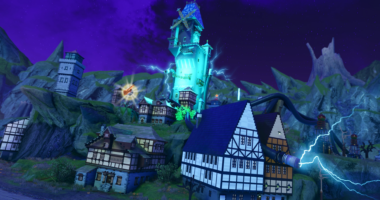A HUGE meteor lit up the sky over the UK last night.
The burning space rock looked just like a firework and was reported by around 120 Brits.
The UK Meteor Network described the meteor as a “fireball” and retweeted several videos caught on home doorbell cameras.
It came crashing through the atmosphere at about 9.55pm GMT on Sunday.
Sightings were reported from all over the UK including in Scotland and Somerset.
Amazed stargazers took to Twitter to share what they saw.
One told the UK Meteor Network: “I saw this in Manchester! Incredible!!!!!”
Another said: “I saw one as i was taking my recycling bin out and that was about 9.55pm and I live in Slough, Berkshire.”
Others described spotting what they thought was a firework and some people even reported hearing an explosion.
The space rock would have burnt up as it entered our atmosphere and this created the streak of light behind it.
Meteors fall over the planet everyday but not all of them create such a big fireball spectacle.
They also often fall over the sea or uninhabited land so can go undetected.
Some people have reported spotting what they think are meteorite fragments in their gardens in England.
The UK Fireball Alliance calculated the meteorite strewn field as a patch stretching from near Cheltenham to Bourton-on-the-Hill.
Meteors don’t always leave evidence behind though, some fully vaporise in our atmosphere.
What’s the difference between an asteroid, meteor and comet?
Here’s what you need to know, according to Nasa…
- Asteroid: An asteroid is a small rocky body that orbits the Sun. Most are found in the asteroid belt (between Mars and Jupiter) but they can be found anywhere (including in a path that can impact Earth)
- Meteoroid: When two asteroids hit each other, the small chunks that break off are called meteoroids
- Meteor: If a meteoroid enters the Earth’s atmosphere, it begins to vapourise and then becomes a meteor. On Earth, it’ll look like a streak of light in the sky, because the rock is burning up
- Meteorite: If a meteoroid doesn’t vapourise completely and survives the trip through Earth’s atmosphere, it can land on the Earth. At that point, it becomes a meteorite
- Comet: Like asteroids, a comet orbits the Sun. However rather than being made mostly of rock, a comet contains lots of ice and gas, which can result in amazing tails forming behind them (thanks to the ice and dust vapourising)
In other space news, a stunning image showing ultra-rare lightning has been revealed by astronomy researchers.
Nasa announced that it is accepting applications for wannabe space explorers who wish to fire their name to the Red Planet.
And, Elon Musk has warned that humanity may “self-extinguish” before we can colonise Mars.
What do you think of the giant meteor footage? Let us know in the comments…
We pay for your stories! Do you have a story for The Sun Online Tech & Science team? Email us at [email protected]
This post first appeared on Thesun.co.uk

















